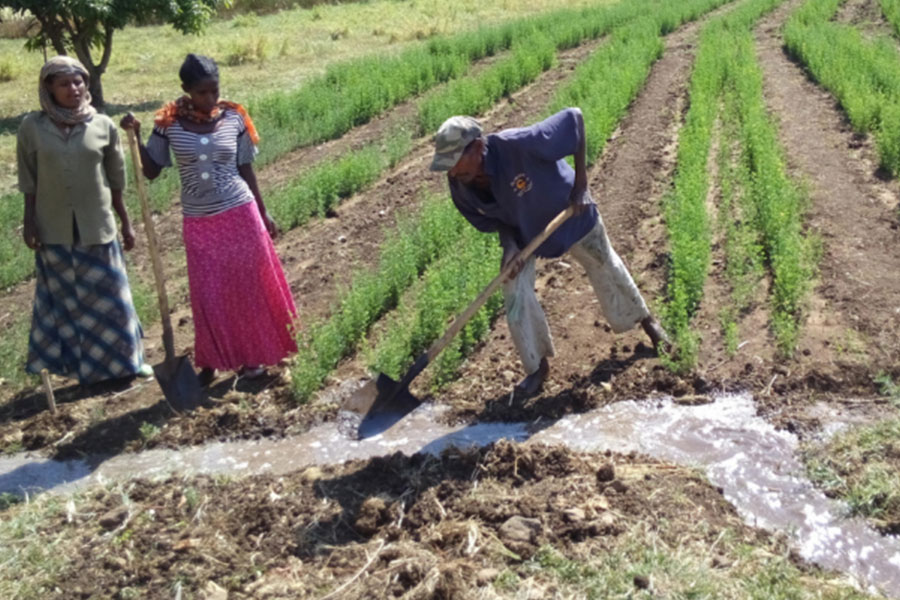
Fortune News | Apr 09,2022
Feb 15 , 2020
By GELILA SAMUEL ( FORTUNE STAFF WRITER
)
The collateral agreement cannot last more than 10 years.
Landholding farmers will soon access loans from financial institutions using their land as collateral, according to the revised rural land administration and use draft proclamation.
Drafted by the Ministry of Agriculture, the bill, which was revised after 15 years, was sent to the Council of Ministers for approval. Before tabling it to the Council, the bill that has been in the making for the last five years was reviewed by the Office of the Attorney General and a legal team at the Office of the Prime Minister.
Introducing new schemes for farmers, including accessing loans using land as collateral and sharecropping, the bill is expected to be legislated this year. It is also part of the recently rolled out agriculture sector reform that aims at increasing productivity.
"It has become necessary to improve the livelihood of farmers and pastoralists at the level of the country’s economic, political and social development," reads the bill, explaining the rationale for the amendment.
The existing proclamation partially and fully restricts farmers from renting, donating or accessing loans using their land.
The draft law gives farmers the right to rent out their land but restricts the rental period to 30 years.
After securing a collateral agreement that is authenticated and registered by regional governments, landlord farmers can access loans from the financial institutions. The draft proclamation limited the maximum length of a collateral agreement to 10 years.
If the borrower fails to pay the debt on time, the creditor may have the right to use the land for the specified time. And if the creditor generates more money given to the borrower by using the land, the debtor may not claim the difference, according to the bill.
Regional rural administrations will establish departments in their respective weredasto register potential leasers and lessees and conduct an assessment on the local rental market and avail information to interested parties, according to the bill.
The move is a profound one that will enhance the growth of the sector, according to Tadele Demissie, general manager of Licha Hadiya Farmers Cooperative Union. Established in 1995, the Union has 86,000 farmers who mainly grow wheat.
"The main problems of the farmer are the access to finance to get better seed and mechanise the system of farming," said Tadele, whose member farmers have between two to 10ha of land.
The new bill also introduces incentives for farmers who exchange their landholdings for consolidation purposes. For example, a farmer might own several different parcels that are split off from one another. The farmer will now be able to trade land with an adjacent farmer in order that each gains contiguous parcels.
The government plans to roll out a three-year pilot project on land consolidation with the agreement of farmers to test the effectiveness of the scheme, according to Abebaw Abebe, a land law expert and land administration case team coordinator at the Ministry of Agriculture.
The bill also introduces sharecropping, where a landowner allows a tenant to use the land in return for a share of the produced crops for a specified period of time. However, it put no time restrictions on women and vulnerable groups.
If a landlord is deceased without leaving a will, or where the will is invalidated, those who engage in a permanent agricultural livelihood can inherit the land. However, those who have substantive income from non-agricultural activities may not hold rural land, according to the bill.
Women, children and social affairs institutions can represent poor women and vulnerable groups in court if disputes arise over the land of these vulnerable groups, according to the bill.
“One of the biggest issues for female-led households is the protection of their rights at times of conflict,” said Abebaw.
Currently, close to 23pc of farming households in Ethiopia are female-led.
The bill also outlines the move into digital administration by establishing a unique parcel identification number for each plot of land and establishing a digital land information system.
“We receive a lot of complaints about compensation after farmers are relocated from their holdings," said Abebe Fentaye, general manager of Ashenge Farmers Cooperative Union, which was established in 1996. The Union currently operates with 32,000 farmers and 31 employees and works mainly on wheat, honey and dairy products.
Last year, the parliament legislated a bill that raised compensation payments for farmers when they are relocated for redevelopment purposes. It also privileges the property owners relocated from their land to own shares in the investment project that takes over their land. Separately, a rehabilitation fund to help relocated landholders is in the making. It will also enable the farmers to get a fair and proportional replacement of land.
Currently, there are close to 50 million farms in the country, while agriculture represents 46pc of GDP.
Out of the 20 million farms who are registered to receive land holding certificates since 2011, close to 15 million of them have secured the certificate.
When the government makes policy changes, it should also work on creating awareness on how to utilise resources for the farmers, according to Alem Mezgebo, a lecturer on natural resource economics and policy.
"Equipping the farmer with a lot of rights without addressing their lack of awareness is a futile action by the government," said Alem, who works at Haramaya University's School of Agricultural Economics & Agribusiness Management.
PUBLISHED ON
Feb 15,2020 [ VOL
20 , NO
1033]

Fortune News | Apr 09,2022

Fortune News | Apr 02,2022

Viewpoints | Mar 21,2020

View From Arada | Dec 14,2019

Fortune News | Jul 18,2021

Sunday with Eden | Dec 24,2022

Editorial | Dec 07,2019

Fortune News | Jul 22,2023

Radar | Dec 24,2022

Radar | Apr 27,2025

Dec 22 , 2024 . By TIZITA SHEWAFERAW
Charged with transforming colossal state-owned enterprises into modern and competitiv...

Aug 18 , 2024 . By AKSAH ITALO
Although predictable Yonas Zerihun's job in the ride-hailing service is not immune to...

Jul 28 , 2024 . By TIZITA SHEWAFERAW
Unhabitual, perhaps too many, Samuel Gebreyohannes, 38, used to occasionally enjoy a couple of beers at breakfast. However, he recently swit...

Jul 13 , 2024 . By AKSAH ITALO
Investors who rely on tractors, trucks, and field vehicles for commuting, transporting commodities, and f...

Sep 6 , 2025
The dawn of a new year is more than a simple turning of the calendar. It is a moment...

Aug 30 , 2025
For Germans, Otto von Bismarck is first remembered as the architect of a unified nati...

Aug 23 , 2025
Banks have a new obsession. After decades chasing deposits and, more recently, digita...

Aug 16 , 2025
A decade ago, a case in the United States (US) jolted Wall Street. An ambulance opera...